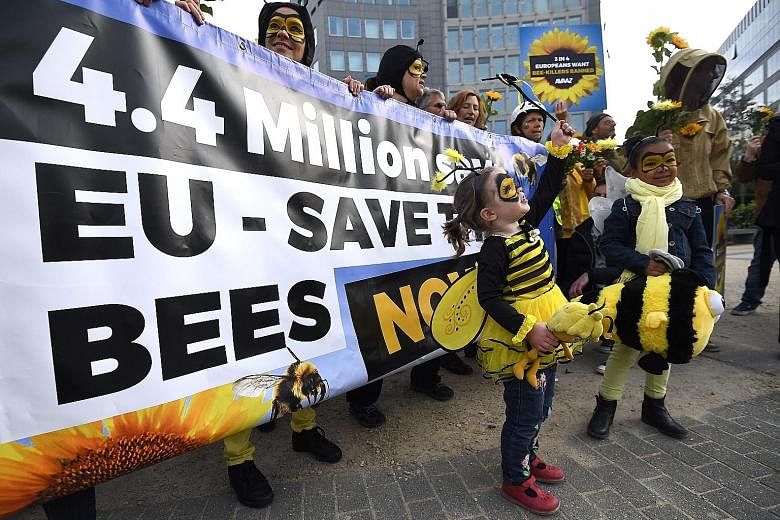BRUSSELS • The European Union has backed an almost total ban on insecticides blamed for killing off bee populations, in a move hailed by environmentalists as a "beacon of hope".
Bees help pollinate 90 per cent of the world's major crops, but in recent years have been dying off from "colony collapse disorder", a mysterious scourge blamed partly on pesticides.
EU countries voted for a ban on the use of three neonicotinoid pesticides in fields, the European Commission said yesterday, meaning that they can now be used only in covered greenhouses where they cannot get into the environment.
Campaigners dressed in black and yellow bee suits brought a huge inflatable bee to a rally outside the headquarters of the European Commission in Brussels ahead of the vote. Chemical giants opposed the decision, saying it would hurt European farmers.
The EU brought in a partial ban in 2013 but decided on more drastic action after a major report by the European Food Safety Authority said in February that the chemicals posed a risk to honey bees and wild bees.
EU Environment Commissioner Vytenis Andriukaitis said he was "happy that member states voted in favour of our proposal" to restrict the chemicals, and tweeted a picture of the activists.
-
90%
Percentage of world's major crops helped in pollination by bees, which in recent years have been dying off from "colony collapse disorder", a mysterious scourge blamed partly on pesticides.
A commission statement said EU states had "endorsed a proposal by the European Commission to further restrict the use of three active substances... for which a scientific review concluded that their outdoor use harms bees".
The pesticides - clothianidin, imidacloprid and thiamethoxam - are based on the chemical structure of nicotine and attack the nervous systems of insect pests.
Environmental groups, which have long campaigned for a ban on neonicotinoids, were abuzz.
Greenpeace said it was "great news for bees, other pollinators and our wider environment". But it added that "the EU must make sure they're not simply replaced with other harmful pesticides".
But two chemical giants whose products are affected - Switzerland's Syngenta and Bayer of Germany - opposed the ban.
Bayer said it was "a sad day for farmers and a bad deal for Europe".
It said in a statement that it "will not improve the lot of bees or other pollinators. The decision will further reduce European farmers' ability to tackle important pests, for many of which there are no alternative treatments available".
Syngenta said the decision was "disappointing, but not unexpected", adding that it "does not believe today's decision is the right outcome for European farmers or for the environment".
Unlike contact pesticides - which remain on the surface of foliage - neonicotinoids are absorbed by the plant from the seed phase and transported to leaves, flowers, roots and stems.
They have been widely used over the last 20 years, and were designed to control sap-feeding insects such as aphids and root-feeding grubs.
The United Nations warned last year that 40 per cent of invertebrate pollinators - particularly bees and butterflies - risk global extinction.
AGENCE FRANCE-PRESSE

